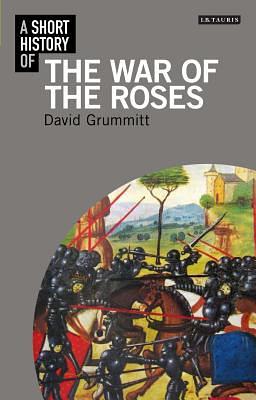The Wars of the Roses (c. 1450-85) are renowned as an infamously savage and tangled slice of English history. A bloody thirty-year struggle between the dynastic houses of Lancaster and York, they embraced localised vendetta (such as the bitter northern feud between the Percies and Nevilles) as well as the formal clash of royalist and rebel armies at St Albans, Ludford Bridge, Mortimer's Cross, Towton, Tewkesbury and finally Bosworth, when the usurping Yorkist king Richard was crushed by Henry Tudor. Powerful personalities dominate the period: the charismatic and enigmatic Richard III, immortalized by Shakespeare; the slippery Warwick, 'the kingmaker', who finally over-reached ambition to be cut down at the battle of Barnet; and guileful women like Elizabeth Woodville and Margaret of Anjou, who for a time ruled the kingdom in her husband's stead. David Grummitt places the violent events of this complex time in the wider context of fifteenth-century kingship and the development of English political culture. Never losing sight of the traumatic impact of war on the lives of those who either fought in or were touched by battle, this captivating new history will make compelling reading for students of the late medieval period and Tudor England, as well as for general readers.
.
【Review】
.
'David Grummitt provides the best overview to date of this bewildering conflict... Highly recommended.'
--Desmond Seward, BBC History Magazine
.
David Grummitt has succeeded triumphantly in writing a refreshing and multi-layered book. It will engage the general reader (and the writer of fiction and non-fiction too!), the student who needs a clear, up-to-date and informative guide, as well as those already acquainted with the Wars of the Roses - including Dr Grummitt s fellow historians. In comparing the campaigns of 1459-64, 1469-71 and 1483-7 between Lancaster and York, David Grummitt offers vivid and often fresh judgments on the characters and failings of kings, most notably Henry VI, Edward IV and Richard III, and those nobles ? Richard of York, Warwick the Kingmaker and the duke of Buckingham ? whose intrigues promoted the struggles. He deftly weaves the results of recent research (some of it his own) into the discussion. In a particularly elegant chapter, he takes the story beyond high politics to locate the commons of shire and town within the political nation and with a shared responsibility for the commonweal . As a notable historian of 15th- and early 16th-century England, Dr Grummitt writes with mature confidence and a pellucid style. He is robust and challenging without being opinionated: he values the opinions of other historians and likes a controversy, thereby helping his readers to come to their own conclusions. To this end, the book is thoughtfully structured: its substantial Dramatis Personae, three royal and noble Family Trees and an authoritative Bibliography linked to each chapter make this book a valuable work of reference as well as a compelling and stimulating read.
--Ralph A Griffiths, OBE, Emeritus Professor of Medieval History, Swansea University
.
David Grummitt's book provides clear guidance to a complex, debated and confusing chain of events. It is the new academic narrative that is long overdue. That it presents the complex chronology clearly and succinctly will be particularly appreciated by students. Grummitt cuts through the succession of events and hordes of personalities to the key turning points and issues. The principal characters are brought to life and made understandable. Rather than sitting on the fence, Grummitt provides reasoned discussions and assessments, justifying Richard Duke of York s actions in the 1450s and Richard III s usurpation on terms that the characters themselves would have understood. The international dimensions of the Wars are a particular strength. Telling use is made of contemporary quotations. A useful bibliography to further reading is provided.
--Michael Hicks, Professor of History, University of Winchester
